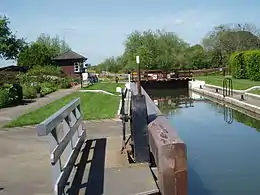Pinkhill Lock
Pinkhill Lock is a lock on the River Thames in England. It is close to Farmoor, Oxfordshire.
 | |
| Waterway | River Thames |
|---|---|
| County | Oxfordshire |
| Maintained by | Environment Agency |
| Operation | Manual |
| First built | 1791 |
| Latest built | 1898 |
| Length | 34.59 m (113 ft 6 in) [1] |
| Width | 4.90 m (16 ft 1 in)[1] |
| Fall | 1.05 m (3 ft 6 in)[1] |
| Above sea level | 199' |
| Distance to Teddington Lock | 101 miles |
| Coordinates | 51.760142°N 1.363602°W |
Pinkhill Lock | |||||||||||||||||||||||||||||||||||||||||||||||||||||||||||||||||||||||||||||
|---|---|---|---|---|---|---|---|---|---|---|---|---|---|---|---|---|---|---|---|---|---|---|---|---|---|---|---|---|---|---|---|---|---|---|---|---|---|---|---|---|---|---|---|---|---|---|---|---|---|---|---|---|---|---|---|---|---|---|---|---|---|---|---|---|---|---|---|---|---|---|---|---|---|---|---|---|---|
| |||||||||||||||||||||||||||||||||||||||||||||||||||||||||||||||||||||||||||||
The first lock was built of stone by Daniel Harris for the Thames Navigation Commission in 1791.[2]
The weir is on the other side of the island and carries a public footbridge. The name Luck's or Lot's Hole is given to part of the weir stream.
History
The lock is named after a farm in the area and is on the site of a former weir and flash lock owned by Lord Harcourt who maintained rights over it. It is one of the Commission's early locks and like St John's was built by J. Nock. The lock was partially rebuilt in 1877 and a house was proposed at the same time. Previously the keeper lived at Eynsham and covered the whole stretch from Newbridge to King's Weir. A new cut was dug below the lock by 1899 when some reconstruction was carried out.[3] The stone lock keeper's house dates from 1932.
Access to the lock
The lock can be reached (by authorised vehicles or on foot) from Farmoor on a track behind the reservoir.
Reach above the lock
The river winds past Farmoor Reservoir and Bablock Hythe where there used to be a ferry. This part of the river was frequented by Matthew Arnold and his "Scholar Gipsy".
The Thames Path crosses the river over the lock head gates to the northern bank towards Stanton Harcourt, and rejoins the river at Bablockhythe. It then continues alongside the river to Northmoor Lock.
Sources
- H.M. Colvin (1997). A Biographical Dictionary of British Architects, 1600-1840. New Haven: Yale University Press. p. 484. ISBN 0-300-07207-4.
- Thacker, Fred. S. (1968) [1920]. The Thames Highway: Volume II Locks and Weirs. Newton Abbot: David and Charles.
References
- "Environment Agency Dimensions of locks on the River Thames". web page. Environmental Agency. 8 November 2012. Retrieved 17 November 2012. Dimensions given in metres
- Colvin, 1997, page 484
- Thacker, 1920/1968, page 90-93
External links
- Weir behind Pinkhill Lock at geograph.co.uk
| Next lock upstream | River Thames | Next lock downstream |
| Northmoor Lock 6.21 km (3.86 mi) [1] |
Pinkhill Lock Grid reference: SP440071 |
Eynsham Lock 2.38 km (1.48 mi)[1] |
| Next crossing upstream | River Thames | Next crossing downstream |
| Hart's Weir Footbridge | Pinkhill Lock | Swinford Toll Bridge |
| Next crossing upstream | Thames Path | Next crossing downstream |
| northern bank Newbridge |
Pinkhill Lock | southern bank Medley Footbridge |
- "Environment Agency Distances between locks on the River Thames". web page. Environmental Agency. 8 November 2012. Retrieved 19 November 2012. Distances given in km